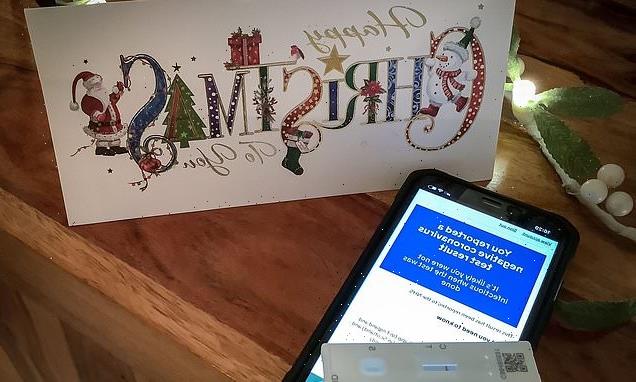Isolation for positive Covid cases is cut from 10 to seven days releasing up to 280,000 to enjoy Christmas – but unvaccinated contacts must still quarantine for the full 10 days
- Infected patients now advised to take tests 24 hours apart on day six and seven
- If these come back negative, they can stop quarantining, the UKHSA said today
- This applies to thousands of people who thought they’d spend Christmas alone
More than 280,000 people infected with coronavirus and facing Christmas alone can now safely enjoy festivities with their families after a change in isolation rules.
Health chiefs have today announced those who test positive for Covid can be released after seven days, rather than 10, providing they take two lateral flow tests at the end of that period.
The UK Health Security Agency (UKHSA) said infected patients can take the tests 24 hours apart on day six and seven of their isolation period, which if negative means they can stop quarantining.
This means the 102,875 people who tested positive on December 15, the 95,058 positive cases the following day, and a further 82,945 people who contracted the virus on December 17, will be free to enjoy Christmas together with loved ones under the new rules.
However, unvaccinated adults who have come into contact with someone infected with Covid must still self-isolate until 10 days after their estimated date of exposure to the virus.
Health chiefs have today announced those who test positive for Covid can be released after seven days, rather than 10, providing they take two lateral flow tests at the end of that period.
The UKHSA said people who leave self-isolation on day seven are strongly advised to limit close contact with other people in crowded or poorly ventilated spaces, and to continue working from home.
This comes after analysis by the UKHSA suggested that a seven-day isolation period alongside two negative lateral flow test results had nearly the same protective effect as a 10-day isolation period without testing.
Studies have also demonstrated that lateral flow device (LFD) tests are just as sensitive at detecting the Omicron variant as they are for Delta.
UKHSA chief executive Dr Jenny Harries said anyone with coronavirus symptoms should still get a PCR test as soon as possible.
She said: ‘Covid-19 is spreading quickly among the population and the pace at which Omicron is transmitting may pose a risk to running our critical public services during winter.
‘This new guidance will help break chains of transmission and minimise the impact on lives and livelihoods.
‘It is crucial that people carry out their LFD tests as the new guidance states and continue to follow public health advice.’
Health Secretary Sajid Javid said the new advice should help reduce the disruption to people’s everyday lives, and urged everyone to get the booster jab.
UKHSA chief executive Dr Jenny Harries said anyone with coronavirus symptoms should still get a PCR test as soon as possible
He said: ‘We want to reduce the disruption from Covid-19 to people’s everyday lives.
‘Following advice from our clinical experts, we are reducing the self-isolation period from 10 days to seven if you test negative on an LFD test for two days running.
‘It’s vital people keep playing their part by testing regularly and isolating if they test positive.
‘And I urge you to get boosted now to protect yourself and those around you.’
Source: Read Full Article







